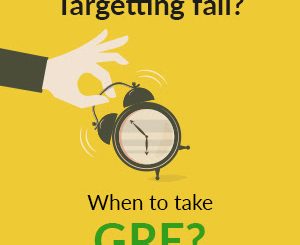GRE Issue Essay: Samples
The Analytical Writing section of the GRE determines your ability to think in a logical and cohesive manner, besides measuring how well you are able to articulate and support your arguments. Given that the Verbal and Quantitative sections are purely objective, the AWA becomes an important means through which you can demonstrate your critical thinking and analytical skills. Strong oratory powers, persuasive writing skills, and ability to think out-of-box are all highly valued by American universities; so if you do well in this section, it will give you a cutting-edge advantage over other applicants. The AWA is also used as a tool to measure the authenticity of your SOPs and LORs: because the AWA tests your writing abilities, it could be potentially used as a yardstick against which the quality of your SOP can be gauged to figure out if it was indeed written by you or someone else. Additionally, too low a score on the AWA can be a red flag for the admissions committee, and so it becomes paramount to do well on the AWA and not take it for granted.
Download our eBOOK on “How to craft a winning SOP“
What Is AWA?
As the very first section of the GRE, Analytical Writing consists of two tasks: an ‘Analyze an Issue’ task and an ‘Analyze an Argument’ task. The time allotted is one hour, with 30 minutes for each task. In the GRE Issue essay task, you will be given a general issue and asked to evaluate and analyze it. You are required to essentially develop a sound argument for the issue and support it with examples, while the Argument task expects you to evaluate a given argument for the correctness of the logic assumed. In other words, the Issue essay seeks to examine your ability to take a stance on a certain subject by developing an argument with reasons and examples to support your views about why you favor a side of the argument. On the other hand, in the Argument task, you are expected to critique and take apart the views that the author promotes in the topic.
In this blog, we will be taking a closer look at the Issue essay to better understand what it really entails, as well as the kind of topics that could be asked of you in this section from the ETS issue pool. Finally, we will be examining some GRE issue essay samples to grasp what a well-written, high-scoring essay looks like.
All About the GRE Issue Essay
A well-written issue essay is basically one that establishes and strongly sustains a particular point of view and gives sufficient justification for the choice of that perspective. Remember, in this section, as we had briefly discussed before, you are expected to understand a given issue and provide ample reasons and examples to support your point of view on the issue. While the examiner will have access to your assessment question, your argument must be clear and strong enough to be understood in a vacuum. In other words, it must be written well enough to rule out the necessity of checking the question at hand. The GRE issue essay task question has two parts: first is a thesis statement (or a claim) and the second is a small paragraph outlining the instructions on how to respond to that thesis. Sometimes, there can be yet another part: a brief reason that explains the claim in more detail.
While there is no ironclad minimum word requirement to meet, most students average around 500–600 words in the 30 minutes allotted to them. Remember, writing more words doesn’t necessarily mean your essay is going to be more persuasive or better. In fact, quite the opposite: many test-takers seem to think that writing more is a good substitute to an essay that is otherwise lacking in sound argument and logic, leading examiners to be wary of overly lengthy essays. Always keep it simple and concise, and you’re good to go.
Let us now take a look at some key elements of a GRE issue essay task, and how it is different from the argument essay:
-
Nature of topic:
Generally, the topics and ideas that need to be probed in the issue essay will be of broad, general nature, and are drawn from everyday life, requiring you to rely on your own experiences for your answer. Issue prompts are taken from a wide variety of domains, such as education, politics, art, technology, etc. As such, it is not necessary to possess a very deep knowledge of the issue at hand, although it certainly helps if your general knowledge is up a notch!
-
Type of writing:
The issue essay is less about critical analysis and more about logical reasoning and justification. Just make sure that your reasoning and justifications are sound, and you should be good to go! Because the issue essay hinges so much on reasoning, it is a great idea to draw on real-life examples to support your position and overall stance on the matter: this will portray you as someone who is well-read and in touch with the world around her. Remember, this is not a section in which you can spin examples out of thin air, so use that wild story that your uncle told you, if you need to!
-
Agreeing and disagreeing:
While the argument essay contains a problematic thesis statement that needs to be disagreed upon and taken apart by you, the issue essay will generally conclude with a mention of the opposing point of view and stating a few instances in which that view may hold true. Doing so will both showcase you as a well-read, aware person, who is able to understand and appreciate opposing viewpoints. Moreover, in the issue essay, it is much easier to agree with the stance than it is to disagree, since you will usually find a lot more argument points in favor of than against. Although, of course, you are free to disagree if you wish: just be convincing about it!
-
Perspectives:
The GRE issue essay is, at the heart of it, a matter of perspective, and what you really think about the question at hand. There’s no real, unequivocal ‘right’ or ‘wrong’ answer, because really it is two sides of the same coin, with both sides being amenable to argument and support. The quality of the essay will be wholly judged by your ability to pick one side of the coin, and how well you develop and support that choice. So, an issue question is a claim that needs to be analyzed and critiqued. This is unlike the argument essay, where the thesis statement itself is deliberately portrayed negatively or controversially so as to provoke your counter-argument.
-
Reasoning versus exposing:
The argument essay is all about you dismantling the author’s claims by exposing the flaws in their arguments, while the issue task is notably about reasoning and building your argument from the ground up by using examples and logic.
-
Liberty to express:
Last but not least, the issue task is defined by the freedom of scope it affords you. While the argument essay mandates you to work entirely with the evidence and arguments that lead up to the conclusion, the issue task is far more liberal because you are free of any authorial interference. Because of this, you can draw on any and every resource in your arsenal to deliver a powerful defense of your perspective.
What kind of topics can I expect on the issue task?
One of the things that daunt GRE test takers is essay writing: specifically, the fear of being tested on a topic or concept they may have no idea or knowledge about. Well, fear not! The GRE issue essay task is known for its supremely approachable and general nature and is broad enough to be attempted by anyone with basic general knowledge. Confused? Cast your mind back to all those family dinners, and your father arguing how mobile phones are destroying creativity and intelligence, or your uncle claiming that higher education should be free for all, and you’ll know what we are talking about. The GRE issue essay is something like those discussions, but with just a bit more sophistication, of course!
Let’s take a peek at some sample issue questions from the previous years’ GRE to better understand the kind of prompts you can expect. Do note that these are directly taken from the ETS (Educational Testing Service) website, and because ETS is the official administrator of the GRE, you can be rest assured that this information is straight from the horse’s mouth.
Sample issue tasks:
- Governments should place few if any, restrictions on scientific research and development.
Write a response in which you discuss the extent to which you agree or disagree with the recommendation and explain your reasoning for the position you take. In developing and supporting your position, describe specific circumstances in which adopting the recommendation would or would not be advantageous and explain how these examples shape your position.
- Claim: It is no longer possible for a society to regard any living man or woman as a hero.
Reason: The reputation of anyone who is subjected to media scrutiny will eventually be diminished.
Write a response in which you discuss the extent to which you agree or disagree with the claim and the reason on which that claim is based.
- College students should base their choice of a field of study on the availability of jobs in that field.
Write a response in which you discuss the extent to which you agree or disagree with the claim. In developing and supporting your position, be sure to address the most compelling reasons and/or examples that could be used to challenge your position.
- Young people should be encouraged to pursue long-term, realistic goals rather than seek immediate fame and recognition.
Write a response in which you discuss the extent to which you agree or disagree with the statement and explain your reasoning for the position you take. In developing and supporting your position, you should consider ways in which the statement might or might not hold true and explain how these considerations shape your position.
Well, there you have it! You now have a general idea of what kind of questions you could expect in the issue task, and the structure of the issue prompts. As you can see, these are questions of a sweeping, unspecified nature, and usually, students find their own experiences, opinions, and awareness sufficient to write a satisfactory essay. Topics like education, healthcare, R&D, art, politics, social media, and gender are usually hot favorites for the ETS, so reading up on these areas and writing a few practice essays can prove to be immensely helpful. If you want the complete low-down on the exhaustive list of topics that make an appearance in the issue essay section, you can download our ebook to get a better idea
Download our eBOOK on “The complete list of GRE AWA Topics“
Now, we have seen the kind of topics and questions you could expect on the d-day, but what about the essay itself? What does a persuasive, well-written, high-scoring issue essay look and sound like? We’re sure we’ve piqued your curiosity, so why not head over to our ebook consisting of a gamut of sample essays?
Download our eBOOK on “How to score 4+ in AWA“
We hope you found this article helpful and illuminating and opened your eyes to the intricacies of the GRE issue essay. If you have any questions that are not answered in this article, please drop us a comment below and we will get back to you soon. We wish you all the very best in your graduate school dreams!









